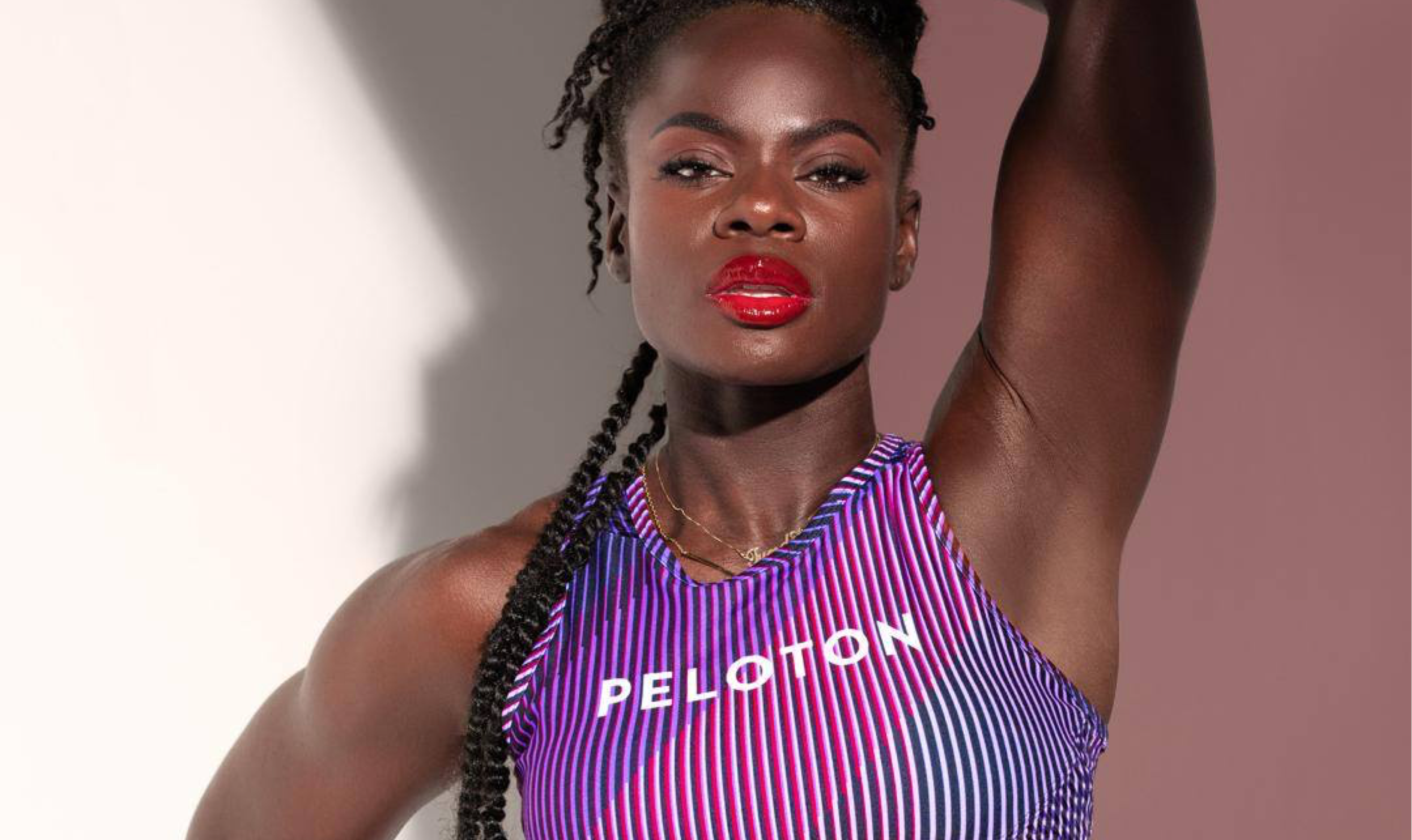How Peloton Built the Most Influential Brand In Fitness During the Pandemic
By: Meredith Bodgas + Kendall Tietz
That’s because when COVID-19 shut down gyms and in-person fitness classes mere months later, Peloton bikes went from an in-home nice-to-have to a must-have for anyone craving workouts and community. In fact, Peloton’s most recent quarterly earnings soared 172 percent year over year, according to CNBC.com, with revenue of $608 million. And those aren’t the only impressive numbers the workout brand posted. The pandemic, at least in part, also sparked Peloton’s massive social following and content engagement growth alongside the creation of a new class of highly influential social content creators: their own instructors. The way the company elevated their cadre of fitness aficionados into virtual celebrities drove more attendance to their real-time and on-demand classes, with less than 1 percent churn in service subscriptions. That’s a lesson for all brands, especially as an uncertain winter approaches.
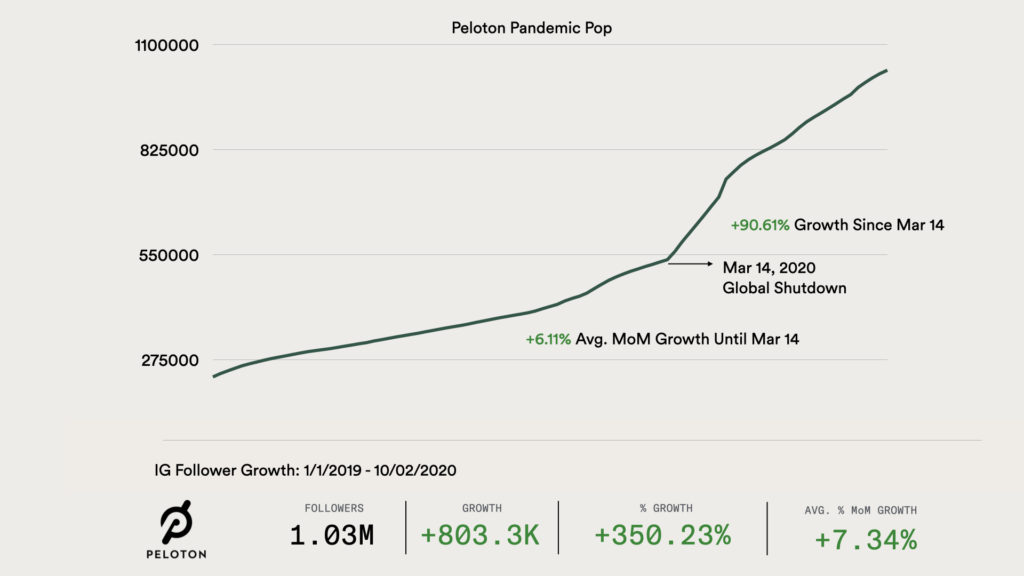
Their Pre-COVID Rise
For six years before the pandemic reached the US, Peloton (@onepeloton) beamed an ever-increasing range of fitness instructors straight into customers’ homes through their bikes and eventually treadmill hardware, with many sessions ending the way their brick-and-mortar counterparts, like SoulCycle and FlyWheel, had: with instructors, such as Alex Toussaint (@alextoussaint25) and Jess King (@jesskingnyc), promoting their social handles. Peloton members have gradually followed their favorite class leaders seeking glimpses into their offline lives, asking them questions–and getting answers–and sharing inspirational stories that their beloved guides savvily embraced.
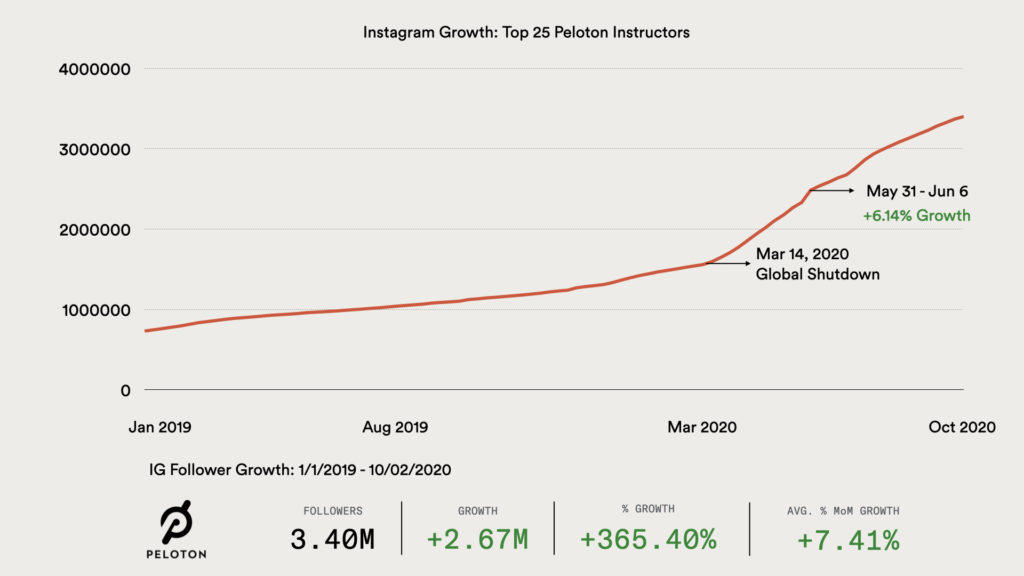
By about 67 percent from January to December 2019
By another roughly 9 percent from January to March 2020
Quarantine Boost: more than doubled from March to September 2020
Reaching Pandemic Prominence
When the pandemic hit, Peloton doubled down on creating a virtual community that’s accessible via social media 24/7, not just when you enter one of the US’ more than 75 brick-and-mortar locations, a pandemic-proof “second screen experience,” if you will. Fast-forward to March 2020, as COVID-19 started shuttering the world as we knew it, Peloton wisely seized the opportunity by promoting a free 90-day trial for their service. That simple taste, coupled with a swelling always-on quarantined community, engaged customers and compelled them to subscribe to the paid service.
We looked at 25 of the most-followed Peloton instructors’ accounts for the past six months, to see just how closely the pandemic correlated to their social media dominance.
Impressive stats. And even more so in context. We compared them to the accounts of top instructors at Peloton competitors SoulCycle (@soulcycle) and Mirror (@getmirror).
The combination of more at-home users, highly engaging social content such as the below, and an assist from the main brand account’s masterful social and community management, (@OnePeloton’s followers grew by 89 percent from March to September) spelled success across the board.
Luring in New Customers
On day 1 of the shutdown in New York, Peloton gave its community something of value: free workout classes. This most-engaging post of the year on their owned channel positioned them for months’ worth of social success. They spread the wealth with their instructors, who turned fandom into revenue.
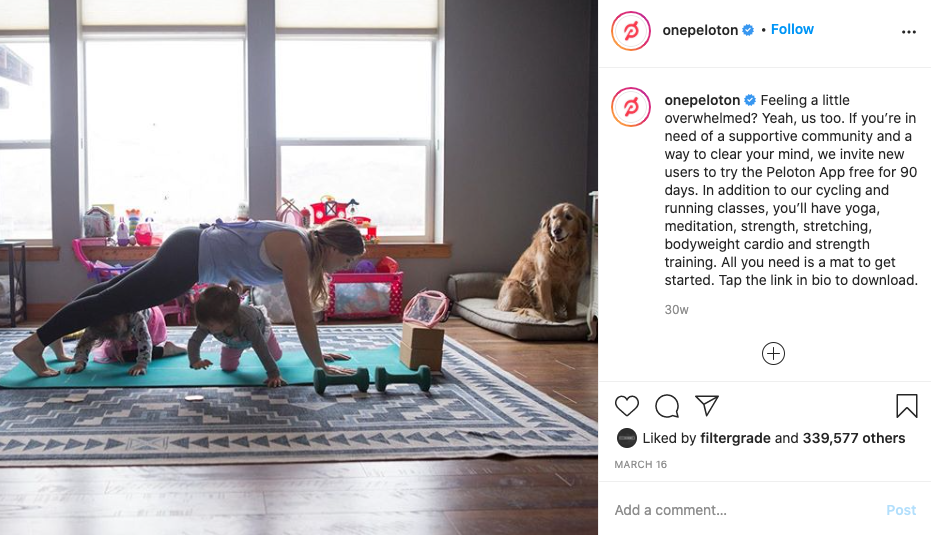
Continuing the Conversation

Getting Real to Get Love

From Nearly Matched to No Contest
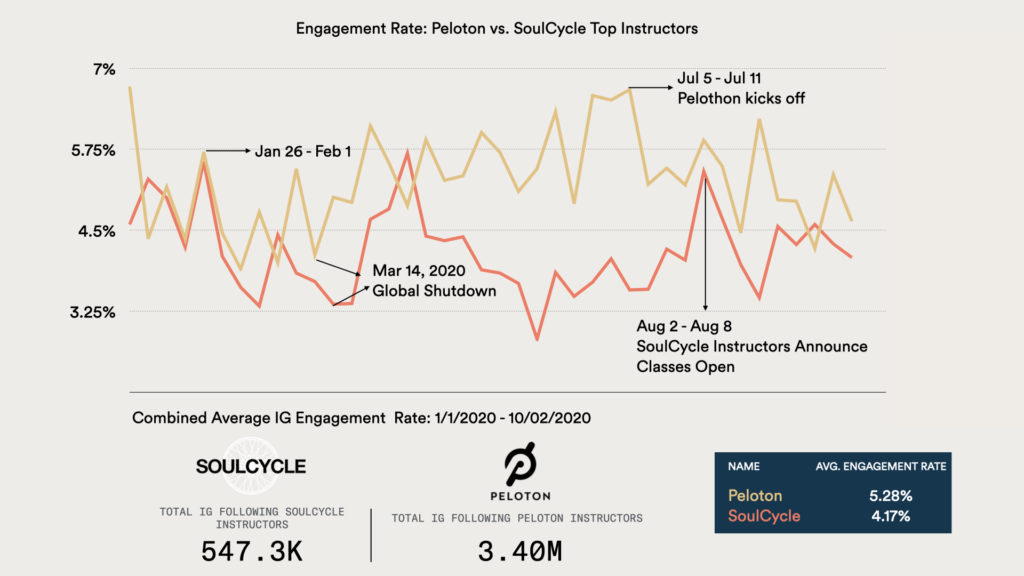
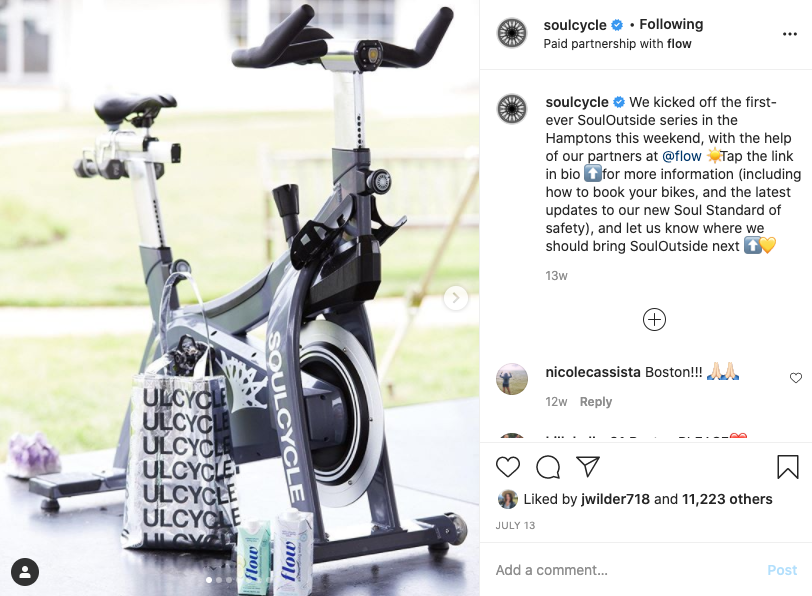
Mirror (@getthemirror), the interactive home fitness system in a reflective glass plate, also mobilized their live and on-demand class instructors on Instagram with success, especially after the June announcement that it had been acquired by workout wear powerhouse Lululemon (@lululemon).
- Average workouts per month on Mirror jumped more than 50 percent since the pandemic started, according to their CEO, and, according to SimilarWeb data, it’s one of the top 15 fastest-growing fitness brands.
- Mirror’s top instructors on Instagram grew their followings by more than 90 percent from the beginning of 2020, with the highest jump coinciding with the shutdown announcement.
Perhaps Mirror’s fast-growing social audience was what enticed Lululemon to buy them, but it still doesn’t compare with the average growth that Peloton instructors saw. Mirror would do well to turn more instructors into celebrities–we only surfaced nine high-performing accounts, to SoulCycle’s and Peloton’s 20+–and make a valuable offering to new customers, publicized by those social celebrities.
As for SoulCycle, their top instructors’ interaction rates climbed with the announcement of Soul Outside in July. That marked the first time in-person sessions returned, with classes began being held safely outdoors, starting in the Hamptons in New York. But without reimagining how to bring their brand to life outside of IRL instruction, their upcoming winter might see a repeat lack of engagement, like in the early-shutdown days.
The lesson: It’s not enough to turn fans into loyal customers through a single owned account or channel. Peloton’s profit power came from turning fitness instructors into talent, into brand advocates, into celebrities. An owned stable of hyper-relevant, engaged, authentic Macro-Influencers who subtly (and not-so-subtly) embody the Peloton brand. They drive ridership with every carefully curated piece of social content–equal parts expert and enthusiast, rider and value driver, becoming the key ingredient in Peloton’s industry-leading social strategy.
It’s good advice for your brand too. We, the editorial board of Social Studies, predict that SoulCycle’s summer social uptick will normalize once fitness fans return to staying in their homes because of colder weather and a potential second wave of COVID-19. That begs an important question for your brand to consider:
- Can you better prepare for this with a social-first content strategy that benefits your customers staying inside more or socially distanced out-of-home?
- Follow Peloton’s lead: Provide potential customers with an opportunity, an escape, a valuable benefit. Identify and activate the most infectious and followed personalities in your organization to tout that offering. Set them loose to evangelize your brand in authentic ways and develop real relationships with these customers.
The Peloton Instructors List:
- @allymisslove– 434k, +62.62%
- @codyrigsby– 378.6k, +125.07%
- @alextoussaint25– 269.6k, +114.93%
- @emmalovewell– 264.6k, +95.04%
- @jesskingnyc– 206k, +59.79%
- @tune2tunde– 172.1k, +274.65%
- @oamato– 161.4k, +133.26%
- @jsimsfit– 145.2k, +231.16%
- @andyspeer– 119k, +20.48%
- @Hannahcorbinnyc- 117k, +59.08%
- @Denis__morton– 116.2k, +81.70%
- @Kalliehouse_– 110.1k, -4.85%
- @Leannehainsby– 113k, +216%
- @Chelsealovesyoga- 107.8k, +122.25%
- @Pelotonjenn- 105.5k, +56.42%
- @Kristinmcgee- 103.9k, +70.34%
- @Benjaminalldis- 76.6k, +233.26%
- @Mattymaggiacomo- 67.6%, +70.74%
- @Becsgentry- 65k, +100%
- @Diti22- 54.6k, +145.10%
- @Adrianwilliamsnyc– 54.3k, +383.79%
- @Selenasamuela- 49.2k, +76.91%
- @Chasetucker- 44.5k, +133.66%
- @Hannahfrankson- 43.6k, +154.81%
- @Annagreenberg- 25.2k, +83.57%
The SoulCycle Instructor List:
- @cathleisure_
- @staceygnyc
- @kymnonstop
- @maddztaddz
- @rebeccaryanfit
- @sjsilk
- @anandahcarter
- @danieladibfitness
- @sjadenyc
- @chrisvpipkinsc
- @emma_zaks
- @jrlkennedy
- @spinvillain
- @lisamoloshok
- @fboomshakalaka
- @yaavano
- @livmcilkenny
- @karynnez
- @daniellipshutz
- @aubreylauryn
- @lisaboccuzzi
- @natashawhitby_
- @tyrelldesean
The Mirror Instructor List:
- @alexsilverfagan
- @lanceaparker
- @gerrenliles
- @chrisryanfitness
- @rachelenicks
- @armondjordan
- @agray35
- @juliesan21
Social Studies leverages proprietary analytics with editorial techniques to push the boundaries of digital marketing capabilities for clients.
Let’s Talk